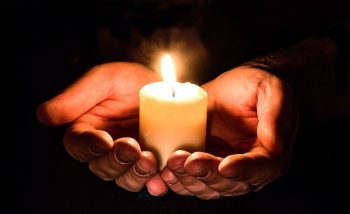French Nursery Rhymes: Au Clair de la lune Posted by Elizabeth Schmermund on Mar 16, 2018 in Culture, Music
A couple of weeks ago, I wrote a nursery rhyme with an interesting origin. That comptine, as nursery rhymes are known in French, might not have been as familiar to English speakers as the one I’m writing about today.
The melody of “Au Clair de la lune” is probably familiar to most people around the world. It’s a simple melody, and one that is often taught to beginners learning musical instruments. “Au Clair de la lune,” translated as “By the Light of the Moon,” is also famous for another reason. It is the subject of the oldest recording in the world.
In 2008, the New York Times published an article on the recent rediscovery of the oldest recording in the world. It was actually a 20-second recording of a man singing “Au Clair de la lune” very slowly…in 1860. And that man was Édouard-Léon Scott de Martinville, the inventor of the phonautograph, which was the earliest sound recording device.
The phonautograph used a horn, which vibrated a bristle. The bristle then inscribed an image of the sound patterns on a black-coated cylinder. The phonautograph wasn’t capable of playing back sounds, but was able to inscribe “visual” images of sounds that could then be reconstructed. It predated Edison’s invention of the phonograph by approximately 30 years.
You can listen to this first recorded sound and learn a bit more about how the phonautograph worked here:
As for “Au Clair de la lune,” it dates to eighteenth century, and so it is not an incredibly ancient French folk song. Its author and composer are unknown. It tells the simple story of a man named Lubin who is asking his neighbor, Pierrot, for a quill so that he can write a letter. Pierrot responds that he doesn’t have one, but that Lubin should ask the neighbor, a friendly brune (brunette), instead. Lubin knocks on her door, and she invites him in. The door shuts behind them, with the suggestion that they are looking for a quill and then a candle or lamp, but find love instead.
The lyrics are below, in French and English:
|
“Au clair de la lune, Au clair de la lune, Au clair de la lune, Au clair de la lune, |
“By the light of the moon, By the light of the moon, By the light of the moon By the light of the moon |

Build vocabulary, practice pronunciation, and more with Transparent Language Online. Available anytime, anywhere, on any device.




